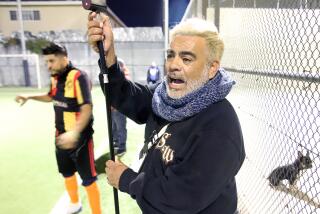WORLD CUP USA ‘94: QUARTERFINALS : Fans Glad That Saachi Is Lucky <i> and </i> Good : Italy: Beleaguered coach makes all the right moves against Spain, even if heat throws off his plans in the second half.
FOXBORO, Mass. — It was only a few minutes after the game when Arrigo Sacchi arrived for his customary inquisition by reporters, and in the stands of Foxboro Stadium, thousands of people wrapped in red, green and white were bringing folk opera al fresco to the Boston suburbs. Jumping, cheering, yelling, weeping, they danced in free-verse pandemonium to drums, cymbals, bugles and their own hoarse chants.
The celebration was for Italy, but not necessarily for the almost mystical coach whose talent-laden team advanced to the World Cup semifinals Saturday on a foggy, almost ethereal, afternoon with a 2-1 victory over Spain.
“I am very satisfied,” Sacchi told reporters. “We were good, and we were lucky.”
It was a tough game, he said, thanking everyone “who supported us through such anguish.”
In the days before the game, more than 80% of Italians polled said they thought the 48-year-old former coach of AC Milan should be fired.
He will have fewer critics now, but as coach, Sacchi still lacks--an occupational hazard--the credibility that Italians habitually accord their national team’s players.
“Sacchi’s a lucky son of a gun,” said Giorgio Chinaglia, the retired star who is Italy’s Pele. “(Julio) Salinas in front of the goal for Spain and doesn’t score. We touch the ball twice in the whole second half and score a goal. With luck like that, we might win it all.”
Winning it all is what Sacchi had in mind when he built a team around Juventus wizard Roberto Baggio, filled it from a rich crop of world-class players and stitched it together with heavy threads of tactics.
Criticism of Sacchi grew when Italy failed to gel in Cup qualifying play, or in lackluster first-round games, or until the last-gasp end of the match against Nigeria in which it staggered into the quarterfinals.
Many Italian soccer analysts (there are, after all, 57 million of them) bemoan what one prominent commentator among them calls Sacchi’s “pseudo culture,” arguing that Italy is over-coached.
In the first half Saturday, Sacchi was vindicated. The second half belonged to the naturalists.
With a revamped lineup--four of the starters against Nigeria were benched--Italy played its best 45 minutes of the Cup to earn a 1-0 lead at the half.
One of the four new starters, Dino Baggio, was reinstalled at midfield in place of Nicola Berti. He scored the goal, and in Sacchi’s judgment was the best player on the field.
“We started out in the first half extremely fast,” Sacchi said. “This is how we planned to play for 90 minutes, but we just couldn’t manage to do it because we were completely exhausted.”
Said Roberto Baggio: “The heat was scary.”
Said Giuseppe Signori, benched for the first half but inserted when the second half began: “We were suffering at the end. It was very humid.”
The heat and the pace of the game unraveled Sacchi’s plans.
“We played our way tactically for the first half,” Sacchi said, “But in the second the players couldn’t respond, they were so tired. We lost strategy, we lost ideas.”
Spain dominated. With the game plan out the window, Italy played slower, more instinctive soccer. And it was a pass from Signori that Roberto Baggio converted into one of the tournament’s prettiest goals. “A champion’s goal,” Sacchi said.
“Once again Baggio shows us that even when he is tired and it is late in the game, he is cool-headed,” said commentator Roberto Beccega, a former Italian national team player.
Sacchi says that tactically every game is different and that the personnel should match the circumstance. On Saturday, he restored goalkeeper Gianluca Pagliuca, who completed a two-game red-card suspension.
And there in the second half, with the score 1-1, was sure-footed Salinas, beating defenders and bearing down on Pagliuca.
“As I watched him come I thought about a return trip home,” Pagliuca joked afterward. Then, reflexively, with a skill born not of planning or strategy, but of practice and patience, “I made the save.”
For Italy then, the victory was another Sacchi answer to critics who will not be assuaged until Italy wins the Cup.
“Ask those who criticize Sacchi what they think now,” said Antonio Matarrese, president of the Italian Soccer Federation. “He built the team around Roberto Baggio. Sacchi has faith in him despite the critics. Bam, Baggio scored. Bam, we won. Bam, we are at the summit of world soccer. I’ve always said Sacchi was unpredictable. He is unpredictable.”






